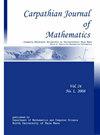A Comparative Study between Haploid Genetic Algorithms and Diploid Genetic Algorithms
IF 1.1
4区 数学
Q1 MATHEMATICS
引用次数: 2
Abstract
In this paper, we make a comprehensive comparison in terms of the quality of the achieved solutions, the corresponding execution time and impact of the genetic operators on the quality of the results between the Haploid Genetic Algorithms (HGAs) and Diploid Genetic Algorithms (DGAs). The standard genetic algorithms, referred to in our paper as HGAs are characterized by the fact that they are using a haploid representation relating an individual with a chromosome, while the DGAs are using diploid individuals which are made of two chromosomes corresponding to the dominant and recessive genes. Even though the general opinion is that DGAs do not provide much benefit as compared to classical GAs, based on extensive computational experiments, we do show that the DGAs are robust, have a high degree of consistency and perform better, sometimes almost twice as well, than the HGAs, but are slower due to the high number of operations to be performed, caused by the duplication of the genetic information. However, the quality of the solutions achieved by the DGAs compensate their relative high execution time. The better quality of the DGAs, proving the efficiency of using diploid genes, is given by the homogeneity of the population which covers the search space thoroughly and in this way being capable of avoiding the local optima.单倍体遗传算法与二倍体遗传算法的比较研究
本文从单倍体遗传算法(Haploid genetic Algorithms, HGAs)和二倍体遗传算法(Diploid genetic Algorithms, DGAs)的解解质量、相应的执行时间以及遗传算子对结果质量的影响等方面进行了综合比较。标准遗传算法,在我们的论文中被称为HGAs,其特点是它们使用单倍体表示与染色体相关的个体,而DGAs使用二倍体个体,由两条染色体组成,对应显性和隐性基因。尽管普遍的观点是,与经典的GAs相比,DGAs没有提供太多的好处,但基于广泛的计算实验,我们确实表明DGAs是鲁棒的,具有高度的一致性,并且性能更好,有时几乎是HGAs的两倍,但是由于要执行的大量操作而变慢,这是由遗传信息的重复引起的。然而,dga实现的解决方案的质量弥补了它们相对较高的执行时间。由于种群的均匀性,使搜索空间完全覆盖,从而能够避免局部最优,从而证明了使用二倍体基因的效率,从而提高了DGAs的质量。
本文章由计算机程序翻译,如有差异,请以英文原文为准。
求助全文
约1分钟内获得全文
求助全文
来源期刊

Carpathian Journal of Mathematics
MATHEMATICS, APPLIED-MATHEMATICS
CiteScore
2.40
自引率
7.10%
发文量
21
审稿时长
>12 weeks
期刊介绍:
Carpathian Journal of Mathematics publishes high quality original research papers and survey articles in all areas of pure and applied mathematics. It will also occasionally publish, as special issues, proceedings of international conferences, generally (co)-organized by the Department of Mathematics and Computer Science, North University Center at Baia Mare. There is no fee for the published papers but the journal offers an Open Access Option to interested contributors.
 求助内容:
求助内容: 应助结果提醒方式:
应助结果提醒方式:


